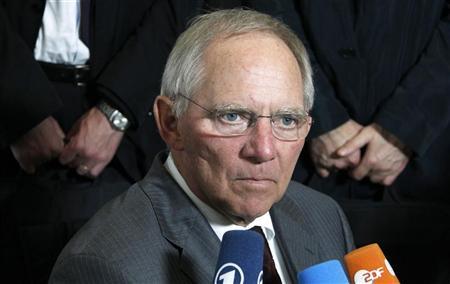(Reuters) – Greece’s new government should stop asking for more help and instead move quickly to enact reform measures agreed to in return for previous bailouts from its European partners, German Finance Minister Wolfgang Schaeuble said on Sunday.

Schaeuble told Bild am Sonntag in unusually blunt language that Greece has forfeited much of Europe’s trust during the sovereign debt crisis, as reflected in an opinion poll covering the euro zone’s four biggest nations and published in the paper.
“The most important task facing new prime minister (Antonis) Samaras is to enact the program agreed upon quickly and without further delay instead of asking how much more others can do for Greece,” said Schaeuble, a close ally of Chancellor Angela Merkel and Europe’s most powerful finance minister.
Greece’s new three-party coalition government said on Thursday it would renegotiate the terms of the 130-billion-euro bailout deal that is helping the country avoid bankruptcy.
The coalition’s platform particularly challenges euro zone paymaster Germany, which has offered to adjust the lifeline’s terms to make up for time lost as a result of two Greek elections since May, but refuses to revise it radically.
Greece wants a two-year extension to the 2014 deadline for it to cut its budget deficit to 2.1 percent of national economic output, from 9.3 percent in 2011. The extension would require an extra 16 to 20 billion euros in foreign funding.
“The ball is now in Greece’s court,” said Schaeuble. “It’s in their hands to win back the confidence of the people of Europe. They’re only going to accomplish that with concrete actions and deeds.”
The poll of 4,000 people in Germany, France, Spain and Italy showed 78 percent of Germans and 65 percent of French people wanted Greece to leave the euro zone, with 51 percent in Spain and 49 percent in Italy also backing a Greek exit.
Big majorities in all four countries, which have a combined population of 254 million, did not expect that Greece would ever repay its bailout loans.
The poll, conducted by the Ifop Institute for Bild am Sonntag and leading newspapers in France, Spain and Italy, showed only small minorities in the four states want to scrap the euro and return to their respective national currencies.
“The poll shows two things,” Schaeuble said. “An overwhelming majority want the euro …and secondly it shows how much trust Greece has forfeited among Europeans.”
The new government must now work to fix its public finances while negotiating with euro zone leaders who are losing patience with Athens after two multi-billion-euro bailouts since 2010 that have failed to stem the crisis.
‘SPENDING OTHER PEOPLE’S MONEY’
Samaras, 61, was sworn in on Wednesday after elections last Sunday ended weeks of uncertainty that rattled financial markets and threatened to push Greece out of the euro zone.
New Democracy narrowly defeated the radical leftist SYRIZA bloc, which wants to tear up the latest bailout deal and austerity program, which it blames for driving the economy ever deeper into recession.
The government will also seek to extend the payment of unemployment benefits to two years from one, to offer benefits to the self-employed without work, and to limit public sector lay-offs. Lenders want the public sector payroll cut by 150,000.
In a separate interview on Sunday published in Der Spiegel news magazine, Schaeuble again ruled out any form of collectivized debt such as euro bonds and defended the German government’s hard line on that.
“It’s because you cannot separate the responsibility for decision-making from the liability,” he said when asked why Germany was so adamantly opposed. “That’s true for almost everything but especially when it comes to money.
“Anyone who has the chance to spend someone else’s money will do that,” he added, before telling the reporter: “You’d do that and so would I. The markets know that. And so from that point of view they wouldn’t be convinced by euro bonds.”
(Editing by Catherine Evans)





